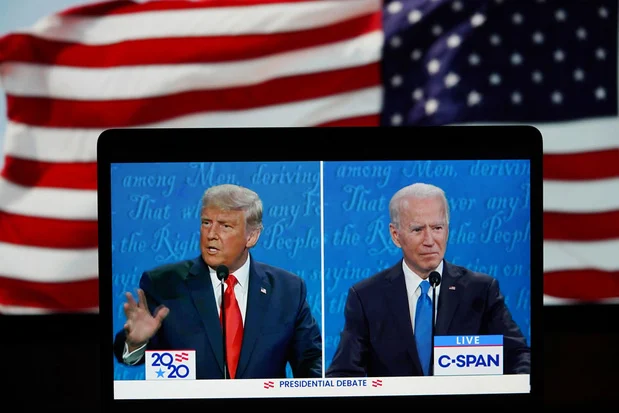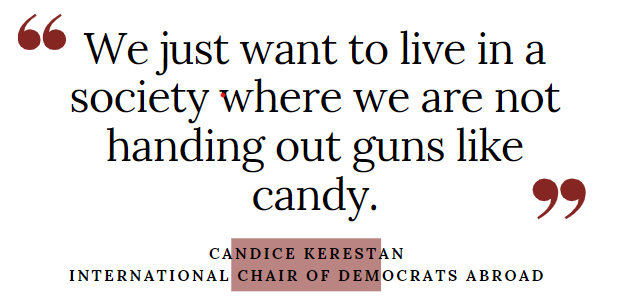As the November 2022 midterm elections in the United States are held tomorrow (Tuesday), the nearly 6.5 million American and dual citizens living outside the US who are eligible to vote could make a difference on important issues, such as abortion and gun safety.
During elections this year, held on Tuesday 8 November, all 435 seats in the House of Representatives and 35 (of the 100) seats in the Senate will be contested, while races for numerous state and local offices will also be held – meaning these midterms are setting the stage for what happens during the next Presidential election in 2024.
"All 435 Representatives in the House and 35 of US Senators are up for election, as are the governors in 36 States and the State legislators in 46 States," the International Chair of Democrats Abroad, Candice Kerestan, told The Brussels Times.
This means that every US and dual citizen has at least one horse in the race at the federal level, but a lot of decisions on important issues – such as gun control and abortion – will also be made at the State and local level. "With the overturning of Roe v Wade, many decisions about reproductive healthcare will happen at the state level, meaning that governors and state legislators will be the ones determining what options women have over their own bodies."
'The margin of victory'
Many Republicans currently in the running for those positions are also vocal election deniers who believe former US President Donald Trump won the 2020 elections and view President Joe Biden’s substantial – and substantiated – victory as illegitimate.
"Our next state and local officials are the people who will be certifying election results for at least the next two years," Kerestan explained, stressing the importance of these midterm elections. "What happens now will have a significant impact on what happens in 2024."
Roughly nine million US and dual citizens live overseas, of which about 6.5 million are eligible to vote. While that may not seem like a large number compared to the nearly 330 million people living in the US, those overseas votes can make a difference – and have done in the past.

Credit: Belga
"In 2020, about 8% of the 6.5 million eligible US citizens abroad voted in the Presidential elections. While there is definitely room for growth, that number is actually very energising because with just 8% of us voting, we swung the election in favour of President Biden," Kerestan said.
Figures show that the votes that came in from abroad were what won the swing states of Arizona and Georgia for President Biden. "We call ourselves 'the margin of victory' because the votes cast from overseas can decide the election for Democratic candidates across the US."
All the same, 8% is still a very low voter turnout percentage. "If we could up that percentage to just 10% that would already be another several hundred thousands of votes for Democratic candidates." In turn, those elected could then help the US to move forward on a lot of issues that many Democrats living overseas want to see in their home country, such as stricter gun controls.
By showing up in 2020, overseas voters have already had an impact on the trajectory of the United States. “Under President Biden’s leadership, major gun safety legislation was signed into law for the first time in over 30 years." This June, President Biden signed the Bipartisan Safer Communities Act, just over a month after a mass shooting at a Texas elementary school, which killed 19 children and two adults, made headlines across the world.
While a lot of the Republican rhetoric suggests that Democrats are trying to take away people's guns and freedoms, Kerestan stressed that "we just want to live in a society where we can be sure that anyone who owns a weapon has been through thorough background checks, and where we are not handing out guns like candy."
"Most of the Americans living outside the US realise that it is possible to live in a safe society where everyone is not armed because they are living in one," she said. "Most of us are living in societies that have prioritised a lot of the changes that we also want to see in the US. Therefore we urge everyone to vote, a lot is at stake."
How do you vote from abroad?
Anyone with American citizenship, including those with dual citizenship, has the right to vote in all US federal elections (such as for President, US Representative, and US Senator) and often in state and local races for Governor and Secretary of State), no matter how long they have been outside the country. "A lot of people who have an American parent and thereby citizenship, do not realise they can vote."
Voting as an American living abroad is a three-step process. First you must request your ballot; go to votefromabroad.org to do so. The website takes you through the overseas absentee ballot request form, known as the Federal Postcard Application, or FPCA. Vote From Abroad shows you where to enter your information, generates the finalised form, and tells you how to submit it. "In most cases, you can just submit it online right away," Kerestan said.
Secondly, you will receive your ballot. Voters’ stateside election offices started sending out their overseas absentee ballots on 24 September, a date prescribed under federal law. "Most people request to receive them by email (which we recommend because it saves them time), others may get them by post, in which case they will get them in the next one or two weeks."
Related News
- 'Devastating': US Supreme Court overturns constitutional right to abortion
- US Governor of Louisiana uninvited to Walloon holiday in Belgium
- 'Enough is enough': Overseas US citizens urged to vote for stricter gun laws
Once voters request their ballots, Democrats Abroad encourages people to vote for every single office listed on the ballot, but especially for the ones at the state and local levels. Those who have yet not done so, can still request their ballot via email and be in time for tomorrow's elections.
Thirdly, they must send the voted ballot back to their local election office in the United States. Exact deadlines and ballot return methods vary significantly by state. Some states allow voters to send voted ballots back by fax or secure online upload, while others require them to be returned by postal mail. "In those cases, it is especially important to send it back as quickly as possible."
Kerestan’s home state of Pennsylvania, for example, requires that overseas voters return their voted ballots by postal mail. “I downloaded my ballot, voted for great Democratic candidates at every level, and took it straight to the post office. Now it is all hands on deck to make sure my fellow citizens vote now for November, too.”
More information can be found at votefromabroad.org and democratsabroad.org.


